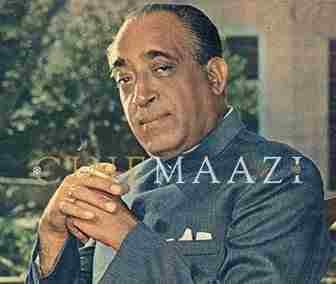Rustomji Dotiwala
Subscribe to read full article
This section is for paid subscribers only. Our subscription is only $37/- for one full year.
You get unlimited access to all paid section and features on the website with this subscription.
Not ready for a full subscription?
You can access this article for $2 , and have it saved to your account for one year.
- Primary Cinema: Hindi
- Spouse: Putli Jamshed Mada
Active in the early silent film era of Indian cinema, Rustomji Dotiwala was a director and production manager attached to the pioneering Madan Theatres. He is known for films such as Bilwa Mangal (1919), and Mahabharat (1920). He is credited with directing the first feature film made in Calcutta, namely Satyawadi Raja Harishchandra (1917) produced by theatre and film magnate, J F Madan. Dotiwala was the husband of Putli Jamshed Madan, daughter of J F Madan.
Among his earliest films, Dotiwala directed the silent drama film Satyawadi Raja Harishchandra in 1917. Written by Pt. Nityabodha Bidyaratna, it starred Mrs Savaria as Taramati, Hurmusjee Tantra as Harishchandra, Mrs Gaharjan, and Behram Shah as Vishwamitra. Produced by J F Madan’s Elphinstone Bioscope—the predecessor of Madan Theatres—it is credited as the first remake in Indian cinema; being a remake of the first Indian feature film, Raja Harishchandra (1913) and being inspired by an Urdu language drama, Harishchandra written by Narain Prasad Betab. It was also the first feature film made in Calcutta. The intertitles used were in the Bengali language. The story revolved around King Harishchandra, the 36th king of the solar dynasty, who donated his entire kingdom and sold himself and his family to keep the promise given to the sage Vishvamitra in a dream. The film was advertised as a “photographed play’ with male lead Hurmusjee Tantra as "the 'Irving' of the Indian stage" and female lead Savaria, as "the most beautiful and emotional star". The film also starred Italian artists Signor and Signora Manelli. Other members of the film were recruited from Baliwala Victoria Theatrical Company, a Parsi theatre company based in Bombay. The film’s running time was two hours, making it the longest Indian feature film made till 1931.
In 1919, Dotiwala directed the romance genre film Bilwa Mangal, written by Champsi Udeshi and starring Gohar Jan as Chintamani and Dorabji Mewawala as Bilwamangal. Also known as Bhagat Soordas, the film was produced by Madan’s Elphinstone Bioscope. Depicting the medieval Hindu devotional poet Bilwamangal (also identified with Surdas), the plot is based on the popular legend of the Krishna devotee Bilwamangal (played by Dorabji Mewawala) who falls in love with the courtesan Chintamani (played by the popular Parsi stage actress Miss Gohur). Chintamani is an ardent devotee of Lord Krishna and spends most of her time singing bhajans in praise of Lord Krishna. His attraction towards Chintamani eventually draws Bilwamangal closer towards Lord Krishna and transforms his life forever. The story of the transformation of the philandering Bilwamangal into saint poet Bhakta Surdas fascinated a number of filmmakers during the period. The original nitrate print of the film was stored at La Cinematheque Francaise in Paris. While the original film was 12,000 feet long, in 2016 the National Film Archive of India (NFAI) acquired a digital print in 2K resolution representing 28 minutes of the surviving footage from La Cinematheque Francaise. The film is considered to be the first ever representation of Madan Theatres’ films, which dominated the film industry for almost two decades.
The year 1920 saw Dotiwala direct Madan Theatres’ Mahabharat, based on the epic narrative by Ved Vyas. A historical silent film, it shed light upon the Mahabharata, highlighting the conflict between the Kaurava and the Pandava princes and the consequent Kurukshetra war. Produced by J F Madan, the film released at Cornwallis Cinema in January, followed by Empress Cinema, Bombay, in March the same year.
Dotiwala is also credited as the production manager of Nala Damayanti (1920), a Madan Theatres production directed by Jyotish Bannerjee and Eugenio de Liguoro. It starred Patience Cooper as Damayanti and Keki Adajani as Nala. Based on the Ved Vyas epic, it was written by Girish Chandra Ghosh and Shaida Tulsi Dutt Pt. A big-budget film, it portrayed a famous episode from the epic Mahabharata, starting with Narada’s ascent of Mount Meru. It depicted swarga, the heaven of Indra, the transformation in the clouds of the four gods into impersonations of King Nala, swan messengers of love, the transformation of Kali into a serpent, the meeting of Kali and Dwapor and the four gods amidst the blue air.
On the personal front, Dotiwala was married to Putli Jamshed Madan, daughter of pioneering film producer and exhibitor J F Madan.
-
Filmography (4)
SortRole
-
Mahabharat 1920







.jpg)



